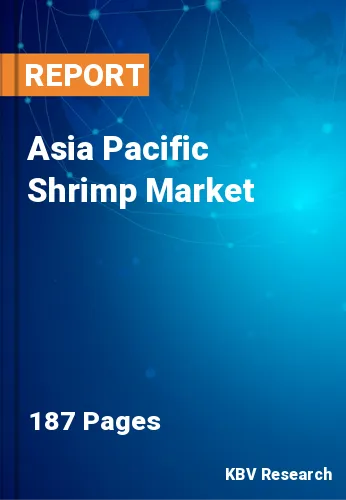The Asia Pacific Shrimp Market would witness market growth of 6.3% CAGR during the forecast period (2023-2030). In the year 2021, the Asia Pacific market's volume surged to 2,609.8 kilo tonnes, showcasing a growth of 4.8% (2019-2022).
Consumers and businesses are increasingly concerned about responsible sourcing and the ecological impact of shrimp farming. This trend has led to the adopting of certification programs and practices that minimize the environmental footprint. Due to rising interest in nutrition and health, shrimp are in high demand as a source of omega-3 fatty acids, lean protein, and essential minerals. Shrimp's nutritional profile aligns with the preferences of health-conscious consumers. The market is experiencing a trend of premiumization, where high-quality and value-added shrimp products, such as large tiger shrimp or peeled and deveined (P&D) shrimp, are in demand. Consumers are willing to pay a premium for superior quality.
Moreover, the convenience food sector is witnessing innovation in shrimp products, including ready-to-cook meals, value-added products, and innovative shrimp-based snacks. These cater to consumers seeking convenient and quick meal solutions. Traceability technology, such as blockchain, is being employed to provide information about the origin, processing, and journey of shrimp products from farm to fork. In response to concerns about overfishing and sustainability, developing alternative protein sources, including plant-based and cell-cultured shrimp, is a growing trend. These alternatives aim to reduce the reliance on traditional shrimp farming. Emerging demands in Asia, Africa, and the Middle East are experiencing a shrimp consumption and production surge, expanding the market reach.
As per the data given by the Marine Products Export Development Authority (MPEDA) of India, during the financial year 2021-22, India's seafood exports were 13,69,264 MT and were valued at $7.76 billion, an all-time high. The two biggest importers of Indian seafood are the USA and China. Shrimp that has been frozen continued to dominate exports. The amount of shrimp exported in 2021–2022 reached an all-time high of 7,28,123 MT, or USD 5,828.59 million. US imports the most frozen shrimp (3,42,572 MT), followed by China (1,25,667 MT), the EU (90,549 MT), South East Asia (44,683 MT), Japan (38,492 MT), the Middle East (37,158 MT), and other countries (49,002 MT). Therefore, with the growing production of seafood in Asia Pacific countries, the shrimp market will rise in the region.
The China market dominated the Asia Pacific Shrimp Market by Country in 2022, and would continue to be a dominant market till 2030; thereby, achieving a market value of $13,205.8 million by 2030. The Japan market is registering a CAGR of 5.6% during (2023 - 2030). Additionally, The India market would obtain a CAGR of 6.9% during (2023 - 2030).
Based on Source, the market is segmented into Aquaculture, and Wild. Based on Distribution Channel, the market is segmented into B2B, and B2C. Based on Form, the market is segmented into Green/ Head-on, Green/ Head-off, Peeled, Cooked, Breaded, and Others. Based on Species, the market is segmented into L. Vannamei, Trachipenaeus Curvirostris, Pleoticus Muelleri, Pandalus Borealis, P. Monodon, Acetes Japonicus, P. Chinensis, and Others. Based on countries, the market is segmented into China, Japan, India, South Korea, Singapore, Malaysia, and Rest of Asia Pacific.
Free Valuable Insights: The Global Shrimp Market is Predict to reach USD 106.7 Billion by 2030, at a CAGR of 6%
The market research report covers the analysis of key stake holders of the market. Key companies profiled in the report include Thai Union Group PCL, Clearwater Seafoods, Avanti Feeds Limited, High Liner Foods, Surapon Foods Public Company Limited, Mazzetta Company, LLC, Aqua Star, Nordic Seafood A/S, The Waterbase Limited and Wild Ocean Direct
By Source (Volume, Kilo Tonnes, USD Million/Billion, 2019-2030)
By Distribution Channel (Volume, Kilo Tonnes, USD Million/Billion, 2019-2030)
By Form (Volume, Kilo Tonnes, USD Million/Billion, 2019-2030)
By Species (Volume, Kilo Tonnes, USD Million/Billion, 2019-2030)
By Country (Volume, Kilo Tonnes, USD Million/Billion, 2019-2030)
Our team of dedicated experts can provide you with attractive expansion opportunities for your business.

